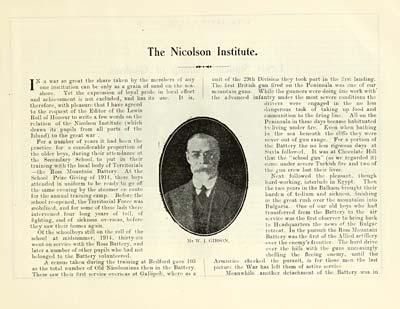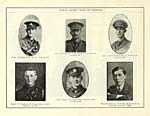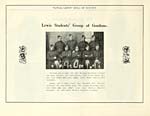Places > Loyal Lewis roll of honour, 1914 and after
(109) Photograph - Nicolson Institute
Download files
Complete book:
Individual page:
Thumbnail gallery: Grid view | List view

The Nicolson Institute.
use. It is,
IN a war so great the share taken by the members of any
one institution can be only as a grain of sand on the sea-
shore. Yet the expression of loyal pride in local^effort
and achievement is not excluded, and has its
therefore, with pleasure that T have agreed
to the request of the Editor of the Lewis
Roll of Honour to write a few words on the
relation of the Nicolson Institute (which
draws its pupils from all parts of the
Island) to the great war .
For a number of years it had been the
practice for a considerable proportion of
the older boys, during their attendance at
the Secondary School, to put in their
training with the local body of Territorials
— the Ross Mountain Battery- At the
School Prize Giving of 1914, these boys
attended in uniform to be ready to go off
the same evening by the steamer en route
for the annual training camp. Before the
school re-opened, the Territorial Force was
mobilised, and for some of these lads there
intervened four long years of toil, of
fighting, and of sickness overseas, before
they saw their homes again.
Of the schoolboys still on the roll of the
school at midsummer, 1914, thirty-six
went on service with the Ross Battery, and
later a number of other pupils who had not-
belonged to the Battery volunteered.
A census taken during the training at Bedford gave 103
as the total number of Old Nicolsonians then in the Battery.
These saw their first service overseas at Galiipoli, where as a
31 v YV
unit of the 29th Division they took part in the first landing.
The first British gun fired on the Peninsula was one of our
mountain guns- While the gunners were doing line work with
the advanced infantry under the most severe conditions the
drivers were engaged in the no less
dangerous task of taking up food and
ammunition to the firing line. All on the
Peninsula in these days became habituated
to living under fire. Even when bathing
in the sea beneath the cliffs they were
never out of gun range. For a portion of
the Battery the no less rigorous days at
Suvla. followed. It was at Chocolate Hill
that the "school gun" (as we regarded it)
came under severe Turkish fire and two of
the gun crew lost their lives.
Next followed the pleasant, though
hard-working, interlude in Egypt. Then
the two years in the Balkans brought their
burden of tedium and sickness, finishing
in the great rush over the mountains into
Bulgaria. One of our old boys who had
transferred from the Battery to the air
service was the first observer to bring back
to Headquarters the news of the Bulgar
retreat. In the pursuit the Ross Mountain
Battery was the first of the Allied artillery
over the enemy's frontier. The hard drive
over the hills with the guns unceasingly
shelling the fleeing enemy, until the
Armistice checked the pursuit, is for these men the last
picture the War has left them of active service
Meanwhile another detachment of the Battery was in
GIBSON.
use. It is,
IN a war so great the share taken by the members of any
one institution can be only as a grain of sand on the sea-
shore. Yet the expression of loyal pride in local^effort
and achievement is not excluded, and has its
therefore, with pleasure that T have agreed
to the request of the Editor of the Lewis
Roll of Honour to write a few words on the
relation of the Nicolson Institute (which
draws its pupils from all parts of the
Island) to the great war .
For a number of years it had been the
practice for a considerable proportion of
the older boys, during their attendance at
the Secondary School, to put in their
training with the local body of Territorials
— the Ross Mountain Battery- At the
School Prize Giving of 1914, these boys
attended in uniform to be ready to go off
the same evening by the steamer en route
for the annual training camp. Before the
school re-opened, the Territorial Force was
mobilised, and for some of these lads there
intervened four long years of toil, of
fighting, and of sickness overseas, before
they saw their homes again.
Of the schoolboys still on the roll of the
school at midsummer, 1914, thirty-six
went on service with the Ross Battery, and
later a number of other pupils who had not-
belonged to the Battery volunteered.
A census taken during the training at Bedford gave 103
as the total number of Old Nicolsonians then in the Battery.
These saw their first service overseas at Galiipoli, where as a
31 v YV
unit of the 29th Division they took part in the first landing.
The first British gun fired on the Peninsula was one of our
mountain guns- While the gunners were doing line work with
the advanced infantry under the most severe conditions the
drivers were engaged in the no less
dangerous task of taking up food and
ammunition to the firing line. All on the
Peninsula in these days became habituated
to living under fire. Even when bathing
in the sea beneath the cliffs they were
never out of gun range. For a portion of
the Battery the no less rigorous days at
Suvla. followed. It was at Chocolate Hill
that the "school gun" (as we regarded it)
came under severe Turkish fire and two of
the gun crew lost their lives.
Next followed the pleasant, though
hard-working, interlude in Egypt. Then
the two years in the Balkans brought their
burden of tedium and sickness, finishing
in the great rush over the mountains into
Bulgaria. One of our old boys who had
transferred from the Battery to the air
service was the first observer to bring back
to Headquarters the news of the Bulgar
retreat. In the pursuit the Ross Mountain
Battery was the first of the Allied artillery
over the enemy's frontier. The hard drive
over the hills with the guns unceasingly
shelling the fleeing enemy, until the
Armistice checked the pursuit, is for these men the last
picture the War has left them of active service
Meanwhile another detachment of the Battery was in
GIBSON.
Set display mode to: Large image | Transcription
Images and transcriptions on this page, including medium image downloads, may be used under the Creative Commons Attribution 4.0 International Licence unless otherwise stated. ![]()
| Rolls of honour > Places > Loyal Lewis roll of honour, 1914 and after > (109) Photograph - Nicolson Institute |
|---|
| Permanent URL | https://digital.nls.uk/100230500 |
|---|---|
| Description | Photograph: Mr W. J. Gibson. |
| Description | Arranged alphabetically by first-named place, starting with Aberdeen. |
|---|

